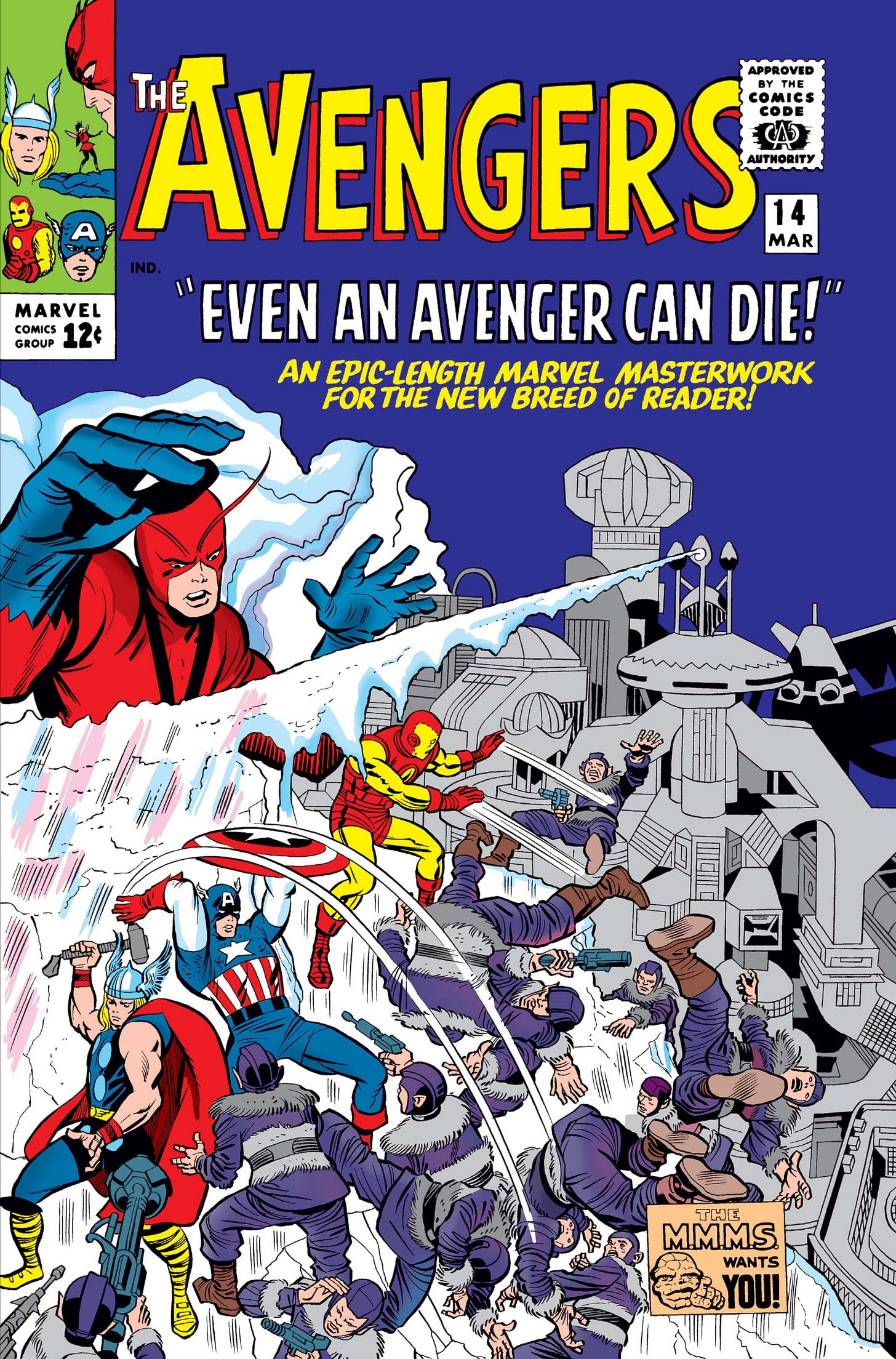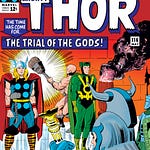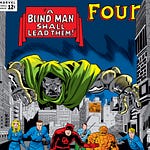In this episode:
Mike and Ed discuss how the Wasp is being treated while she is in critical condition and digress into trying to understand just how fast Thor can fly. He can cross the Atlantic in three minutes. That is faster than any plane, train, or automobile! Is it faster than a rocket? Does he light the air on fire? What would it be like to be saved by Thor at that speed? Do we need to worry about mid-air collisions? Should we apply speed limits to superheroes?
Full episode summary:
The Trouble with Thor's Speed - Controlling Velocity for Protection.
1. The Wasp's Critical Condition: An Update
2. Uncovering the Mystery Behind Thor's Travels
3. Controlling Thor's Speed: A Discussion
4. Speed Limits: The Need for Superhuman Regulation
The Wasp in Critical Condition
Reports of the Wasp's condition have been grim, but optimistic. She is currently stable but in critical care. With the Avengers involved, it is unclear what sort of medical help she is receiving and what types of injuries she sustains. It could be something as common as a car accident or sports injury, or something more specific to what the Avengers do.
The Mystery of Thor's Travel
Interestingly, Thor has been reported to have been flying around the world, potentially looking for a specific doctor to help the Wasp. Reports also indicated that he flew across the Atlantic in three minutes, much faster than any plane could go. Whether he is flying suborbital, as some science fiction theories suggest, or following flight paths at a certain altitude to avoid mid-air collisions, it is remarkable to consider the speeds at which Thor is traveling. One aspect of Thor's power that often goes overlooked is his impressive speed. During a podcast discussion, the hosts discussed just how fast Thor can fly. They estimated that Thor can fly at about 80 times the speed of sound - Mach 80 - which is much faster than any mechanical aircraft on Earth, and even faster than a rocket to the moon.
Controlling Thor's Speed:
The hosts then discussed how Thor's speed might be useful in saving people. They concluded that Thor would need to understand how to control the speed. If he could fly to someone quickly but then decelerate to a stop, he could rescue them before they were injured. They also discussed the amount of power behind his speed, and the air displacement it could cause if Thor flew by someone on the street. All in all, Thor's speed is an extremely impressive part of his power set and is a major factor in why he is considered one of the most powerful superheroes., The speaker highlights the potential problem of an individual traveling at a speed far beyond what humans would normally experience. They discuss the potential damage that could be caused in the wake of someone flying at such a high speed.
The speaker questions whether the superhero, Thor, should partake in control testing far away from other people, to see the damage that could be caused by traveling at such a high speed. They point out that although the idea of traveling from one place to another quickly may sound great, it could lead to destruction in his path. The speaker emphasizes the need for speed limits for a reason, to ensure that people are not traveling too fast, resulting in destruction.
Behind the issue:
This issue deals with the cliffhanger we were left with in issue #13, with the Wasp in critical condition. The story introduces a new alien race, the Kallusians, but they are not revealed to the human race, and they are never mentioned again in the Marvel Universe.
In this issue:
The Wasp is in critical condition, and with not a moment to spare, Thor flies to Norway to basically kidnap a medical specialist, Dr. Svenson, to hopefully save the Wasp’s life. It turns out that Dr. Svenson is an alien in disguise, and when his mask is removed he dies. And so the Avengers are now on the hunt to find the real Dr. Svenson. They do that by tracking down the aliens in the North Pole; they have a futuristic city beneath the Earth’s crust! The aliens subdue the Avengers and, being the bad guys, they monologue about themselves and their plans. They’re the Kallusians, and they escaped an interplanetary war and hid out on Earth. They have trouble breathing on Earth, and when all looked hopeless, Dr. Svenson stumbled their way, and they kidnapped him, convincing him to help them figure out how to breathe on Earth. Dr. Svenson figured out how to help them, but the Kallusians have refused to release him. The Avengers break free, battle the Kallusians, and then find out that Dr. Svenson does not want to leave, as he has agreed to stay and help them with their breathing issues for as long as they need to hide out from their interplanetary rivals. And after that exposition is provided, the Kallusians’ alien enemies locate them on Earth! What are the odds? Anyway, Thor basically scares them to leave the planet and fight their enemies in space, freeing up Dr. Svenson, whom they take to New York City to operate on the Wasp and save her life (he does). The Watcher also shows up at the end of the episode to explain how lucky it was for humanity that the two warring alien races did not duke it out on Earth.
Assumed before the next episode:
The Avengers are likely wondering what to do with the now-abandoned alien city beneath the North Pole.
This episode takes place:
After the Wasp’s life has been saved!
Full transcript:
Edward: the wasp, is still in critical condition? Mike? They think she might recover, but we don't know her her state right now.
Michael: No, but I suppose good news to find out that she hasn't passed away. She hasn't died in the line of battle. And our thoughts are obviously with her and the rest of the team
Edward: I think they're saying stable but critical. So she's in critical care. Mm-hmm. , but not getting worse. Stable. They're trying to find some sort of doctor to help her, and they're communicating with us. And so I think we're cautiously optimistic, right.
Michael: But you gotta wonder, you gotta wonder what is it? We don't know exactly. We know that she was injured injuring battle. But is it something that is a run-of-the-mill medical issue that could happen to any of us if you're in a car accident or you're in a sports event or even in a regular military engagement?
Or is there so. Specific to what the Avengers do, and if it is the latter I'd be curious because we've been following the superhero SUPERPOWERED community for so long, is there something unique that's being done for her? .
Edward: We don't know. And it's nice of them to share at all. I think at this point, you don't want to give away too much of the secret sauce that makes them superheroes and what could possibly hurt them? What are things that can hurt the wasp? Probably the same things that can hurt you and I only, mm-hmm. , she's just far more athletic and capable and able to change.
Michael: Key among them is that she changed the size. I mean, that seems to be, to be an inherently risky thing to do . So I'd be curious about what the injury is, and also it may affect the ability to treat her. I don't wanna speculate too, too much out of respect for the wasp, but I'd imagine that. There could be something complicated about her physiology now.
Edward: We don't even know what size she is now. Is she being treated Yeah. As, a wasp or is she being treated as an adult human, or is she like a giant man? She's extra big. We don't know what size she is. And maybe that's part of the complication. Maybe she is mm-hmm. In a very small form and maybe a very special doctor who's able to treat her with special in.
Michael: Well, and don't say this analogy too, too far, but it could be a regular surgeon who might be involved, or doctor, it could be a pediatric surgeon if she happened to be, you know, size, smaller size, quite frankly, it could be a veterinarian, you know what I mean? To deal with the idea of no, seriously, she, oh, she
Edward: has wings, , maybe her wings are anything.
Michael: She, she has wings, but also she might be super small, like a small animal. Or she could be the size of a horse, you know? And both those were the fields of veterinarians. So I don't wanna, I'm not trying to suggest in any way anything more than she is a mammal who might be a different size and there are specialists that deal with that. And, on we go, good luck to the wasp .
Edward: Do you think this is why, Thor is flying around the world? Is he looking for a specific doctor to help her?
Michael: That's what I started thinking about, so we heard the news, that Thor was being tracked, flying across the ocean and by the reporting, and this is interesting, I hadn't heard this before. Thor traveled across the Atlantic Ocean within minutes, within minutes and , you know, and, and it's like, I would've thought he could have, if you believe he's is an as guardian, he's a, a Norse God from Asgard. that he would travel in some form of interdimensional, something rather, that we don't know about. But no, he didn't, and he didn't do that to go to Europe and said he just flew across the yo.
Edward: We don't, we don't even know what, I think at one point people thought he has his hammer and he is just so strong that he swings his hammer around, throws the hammer and the hammer like, I dunno, the hammer's so powerful. It pulls him in a direction or people thought that he's the, got a thunder. He can control the weather and maybe he's using the winds to pull him around. But neither of those explanations make sense when you can cross the Atlantic in three minutes.
Michael: No, and, the first thought I had is okay, number one, so air travel is carefully regulated. There's flight paths between say New York and London and miami and Dublin. And so there's gonna be paths, and the idea is it's very carefully regulated to make sure that you don't run into people. Uh, so planes don't run into each other as they're flying at the required altitude so is Thor flying? I would imagine Thor to be, if he wants to get there quickly, would probably fly to certain altitude, much like the planes to cut through the air as well as you can. Well,
Edward: I'm sure again, Thor does not wanna be part of a mid-air collision. Imagine the news when Thor runs into an airplane and Families are destroyed and died because he was blasting through them with his hammer. And it seems like that's a very easy thing to avoid by just flying at a different height than airplanes fly at. I'm not sure what flight, I'm sure there's like certain flight paths and certain flight altitudes and he would just fly either like lower or presumably higher.
Michael: Well, but think about this with my point is that I suspect that, and we should talk to an aeronautical engineer we probably could confirm this. There are heights you likely. for maximum, efficiency,
Edward: well that depends on how you fly, right? So airplanes fly because they have engines that are shooting off exhaust that are propelling them forward, and then they have wings that are providing lift. So as they propel forward, the wings provide lift and they get lifted up into the air. And then they can control that up and down. There's no exhaust coming from. , at least no visible exhaust. Unless he's no I don't wanna be vulgar here on the radio, but I don't think there's like exhaust coming from his ass, like pushing out, pushing him through the space
Michael: Too many beans ,
Edward: too many beans. . If, if he's, if he's ever gets into shilling for products, he should definitely promote beans. Like Oh, get your, get your Aus Garan beans from Thor.
Michael: It's a magical fruit. .
Edward: The, the, the more you eat, the more you fly.
Michael: fly. no, but, I'm getting a little bit away from what I really wanna talk about, I would think that there is, if you're Thor and you wanna get across the ocean quickly because your teammate. Needs you to do something, which is what Thor was doing, that you would probably do your best to fly the most efficient way across the ocean. But you're right, I don't think he'd irresponsible. So he is likely isn't flying that high.
Edward: Or, I think he's flying probably higher. Like higher. Here's The Thing too. If, if he's. Given that he's like the mighty Thor, he probably is able to survive pretty high in the atmosphere. I dunno, can he survive in space? It wouldn't surprise me. He feels like he's like, he feels like he's the type of person who would survive in space, didn't he? He sent the absorbing man. Yeah. Right into space. Maybe Thor can survive in space and so if he can survive, he can go high enough. It depends if he's able to, if he's able to propulsion himself high enough, he doesn't need air to prop, repulse himself off of which he may not, then going higher is actually better for him cause it's, it's less wind, there's less wind resistance, less air resistance.
Michael: Could he also, like, could he also break through the atmosphere and spike up and as the earth is, if he's going across to Europe, the earth is moving in his direction and he goes up and then down, that would be. Efficient way of getting, of getting across the earth quickly. Right.
Edward: That's true. So instead of flying in a straight line, he could just fly suborbital that. That's, and there's been lots of science fiction written about that. If you wanted to go mm-hmm. to from London to Sydney as fast as possible, and we had the technology to do it, we would fly a suborbital flight that would blast off. It'd be a parabola, we'd basically a parabola from one to the other. Yeah. And so maybe if that's how Thor travels parabolas.
Michael: I mean, in my head, I must say, I wasn't thinking of parabolas. I was thinking of Thor, kinda like just flying, just barely above the ocean. And hopefully not hitting a ship, but maybe he's the right height to not hit a ship either. But my thought was if he flies across, and this is what I really wanted to talk about, even though I'm kind of fascinated by the idea he'd fly into Pablo, which so cool. ,
Edward: we, we, you, we should, we should have, we should think, talk more about paras. It feels like parabolas are under talked about topic on radio University.
Michael: Our listeners love it. They love those parabolas, but if you are getting across the ocean within minutes, let's say it's about three minutes, and it's about over 4,000 kilometers. Well, you tell me are you applying so fast that you're we're gonna light the, like the air on fire. You know what I mean? That, that seems un unfathomably fast.
Edward: It is remarkably fast. I, so yeah. Let's, let's, let's run through the math and so, okay. I know we are in America and we should be using, local imperial measurements, but when you start talking about the speed that Thor is flying at, we're gonna use that archaic metric system that the French use and cause the math is a lot easier. And so the ocean is like roughly, I think from North America through to Europe. We're talking at roughly 4,800 kilometers, 4,800 kilometers, 3000 and something miles, right? For the rest of us. And then, He did that in three minutes. So he's doing that at what, 1,200 kilometers per minute? That's, uh, no, no, no, no, no, no. He's doing three times that. So he's doing, yeah, in a minute he's doing 15,000 kilometers or 14,000 kilometers or something like that. Per, per, no, no, no, no. That was right the first time. No, no. He's doing a little over a thousand kilometers in a minute, and then in three minutes he gets all the way to the 5,000 kilometers. But that turns out that flying a thousand kilometers a minute is really, really, really, really fast. And like the speed of sound is about a third of a kilometer per second. . We do some math, dividing, whatever. I think it works out too, that he was flying at roughly 80 times the speed of sound. So, so mock 80. Mock 80. For those who are familiar with the mock terms
Michael: And how fast, I mean, what's our fastest plane like, how fast did the rocket to the moon?
Edward: Oh, that's a good question. I don't know I should know that to break the orbit, right? But like I know that planes, like passenger planes don't fly that fast. They fly no, significantly slower than the speed of sound. The really, really fast, like breaking the sound barrier, which we did before we went to the moon. Breaking the sound barrier was a big deal. And that by def the sound barriers was what, what we call mock one and I know we have planes that go faster than the speed of sound now, but not a lot. Fast mock two, mock three, something like that. Thor was going mock. It's fast.
Michael: I don't think that that's fast. It's fast. And I don't think that when I, when we've seen the footage on, on our, the rockets to the moon. I don't, they don't, I don't think they were going that fast. At least visually didn't seem that they're . You get across the ocean. How high, how high is it to get to get, to break the atmosphere? Right. How, how high is it? It's not, how high is the atmosphere? Four. Yeah, it's not tough. 4,000 kilometers and it takes, it took a few minutes certainly to get above, to break the atmosphere. So they're not going as fast as Thor a Thor can get across the ocean.
Edward: No, no. So, so the atmosphere, so I think the atmosphere is bigger than that man. I think the atmosphere is roughly 10,000 kilometers up.
Michael: No,
Edward: yeah, yeah. Like 6,000 miles or. And depends, depends where, depends where you, it turns out there's not like a line, there's not like a fence where like now you're, now you're in space and it slowly becomes less atmospheric all along. But when you start going the, the high atmosphere, it's like roughly, roughly 10,000 kilometers, 6,000 miles.
Michael: Okay. Well, could you get up there in, I guess within 10 minutes? Does it, does the rocket take, did the rocket take 10 minutes to get above there? Which would be kind of similar to Thor flying across the ocean?
Edward: Yeah, so he is going, I think faster than rockets. I think Rockets are going, yeah, I think so. Like somewhere under 10 kilometers. Like they, when they get going to speed, they're going about 10 kilometers a second. And what do we say Thor is doing? Thor's doing. 80 times the speed of sound. And the speed of sound is a third of a kilometer per second. So what's that 80 divided by three? He's doing 20 times, 25 times, times the times. 25 kilometers per second, something like that. And our rockets when they're like, when they're really, when they get this really going up there when they're really picking up speed. They're doing about 10 kilometers a second. And so he's roughly two and a half times faster than a rocket . And so that's, but, but as fast, it's fast. It's fast. But as fast as, rockets aren't setting air on fire. I don't think Thor is setting, he's not setting air on fire fast.
Michael: No, no. But he's still going fast enough, like faster than any any mechanical device on earth,
Edward: he's definitely the fastest human in any form of transportation that's ever happened.
Michael: And it's funny because I guess we've always sort of, when we talk about Thor or any of these heroes, we focus on a few things, like for Thor, we've always focused on, he's a p he's very strong he's a God. But I've never thought much about him flying, which is funny because if you started flying, I would think that's incredible Ed. But it's, um,
Edward: and, and if I started flying at 80 times a speed of sound, you'd be like that is, that is extra incredible. That is like more incredible.
Michael: Yeah. That's worthy of a discussion. But, um,
Edward: that could be don't, but your point is that could be a main power. If someone's power was flying 80 times the speed of sound, we would be. Wow. You are definitely one of the best superheroes on the planet. And yeah, the fact that that was Thor's, fourth or fifth power.
Michael: Yeah. Like Thor. Let's just break it down. So if Thor, if you're walking across the street and you're carrying a coffee and you're not paying attention and a truck comes barreling at you, Thor could easily grab. You know, maybe that's not the most heroic thing, but move you from the, the crosswalk so you don't get struck. But there's probably something, there must be a better example, but I wouldn't even know who saved, you know what I mean? That fast,
Edward: you know, like if he moved that fast on a human, Thor is very solid. He's a very strong human being who bullets bounce off him and that most bolts don't bounce off cars. And so he is big, he is stronger than a car, more solid than a more dense than a car. And if a car was. 80 times the speed of sound and ran into you. You would not be saved. Saving is not The. Thing. That would happen. .
Michael: That's right. Well, is there a way to like, you know, when you catch a ball, someone throws you at a ball at you, right? You kind of grab it and you control the momentum of it. We think we talked about this before. Sure. So is there a way that. How about this? Let's slow it down. ,
Edward: I think, I think if you were thrown at Thor, if someone like threw you at Thor and Thor, caught you, but then went with the motion, the way you went with a ball. Yeah. Then yeah, I think that he could stop you from, from being squished, but if you were flying at him and he said, you know what? I need to get to you quickly. I'm gonna fly towards you at 80 times a speed of sound. Like you're not gonna have a body left after.
Michael: So if Thor is going at 80 times, the speed sound up to you thinking, oh, that person's in a crosswalk he's gonna get struck by that truck that's outta control. And he went up and just touched you. , , his finger would just go right, like right through your body as he just continued on. There must be a way that he could do it.
Edward: Would, would you rather hit by a truck going at. 20 miles, 50 miles an hour. Or Thor going at like 1000 miles an hour.
Michael: Oh, Thor. Thor. It'd be so much cooler to get blown up that way,
Edward: but I guess if you're gonna die, go out in style .
Michael: Well, could you do this? How about this? I'm still now thinking about it. What if Thor went very quickly and went. Under the ground and cut the ground out from underneath you and lifted you through or would like, there'd be so much wind resistance you'd be ripped apart by Well,
Edward: if you move through the air Yeah. You're telling me what if the ground underneath me started flying upwards? Mm-hmm. Immediately at 80 times the speed of sound. Yeah, that would, that's not like, let's be human. When we, when, when, when we first started trying to break the speed of like, the sound barrier, like people died trying to make their break the sound barrier, and that's mock one. We're talking about mock 80. It's not, there's, there's no scenario, no world where, that is a helpful place for a human to be.
Michael: Okay, let me loop back then, ed. I don't know if it's the most useful power then for saving people. Perhaps, but it's useful to get to where you need to go. As long as he's maneuverable and he can stop and maneuver and not run into things, then that part's useful but I was thinking like, what if he'd be a very useful superhero if he could just go really fast and get you outta danger, but if he just blow you up every time he touched you, ?
Edward: No. I think the key is using his speed to get to you and he has to. He just, we need to understand how fast Thor can decelerate. That that's the key. If he can, that's critical fly, fly to you very quickly, but stop on a dime and pick you up gently. Fly away slightly faster than the truck is coming towards you.
Michael: Here's another question then just think about how fast story. So, he's coming at you. Is air being pushed in your direction? Or is it not? Or is it, or is he cutting through it?
Edward: I think generally he's cutting through air. He's moving so fast that I don't think, I think he's moving faster than any air particles getting pushed. I think if he blew pa, if you were like standing on the side of the road and he blew past you, I don't think you would experience anything until he passed you and then all the air he displaced would hit you and it's like a train. When a train comes by, you can feel the train coming after the fact, but it's not coming before the fact.
Michael: Okay, so let's say again, using my example of I'm in the street. Flying on the street, what would happen if he's flying through and, then at that speed, or he is even slowing down, would not like, there would be a train, a trail of destruction right behind him. Things, you know what I mean?
Edward: I, could see that I could see like a bunch of it. It, yeah I think what we're dealing at with is an order of magnitude of speed that I think us normal humans can't really comprehend. And, we just don't, we don't experience speed like this at any normal time in our lives.
Michael: So I, I'd like to, I guess, Thor, I'd like you to maybe do some control testing far away from other people to see, because I mean, just in case you're attempted to like race to the scene of a crime or an incident or some event that you wanted to prevent at first. Seems like a great idea. But in second thought, it sounds like it might be complete, like it'd be fine flying across the ocean it doesn't run into anything. But it wouldn't be that fine if he's flying across North America, if he's getting too low to the ground, causing damage in his, in, in his wake, right.
Edward: Yeah. Hey, hey, we have speed limits for a reason. Thor, we have speed limits for a reason.
Michael: Yeah. Yeah, that's right.














